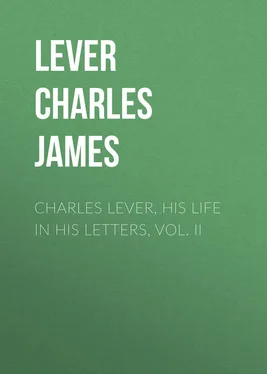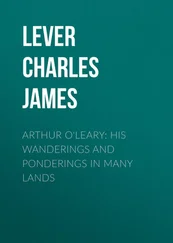Charles Lever - Charles Lever, His Life in His Letters, Vol. II
Здесь есть возможность читать онлайн «Charles Lever - Charles Lever, His Life in His Letters, Vol. II» — ознакомительный отрывок электронной книги совершенно бесплатно, а после прочтения отрывка купить полную версию. В некоторых случаях можно слушать аудио, скачать через торрент в формате fb2 и присутствует краткое содержание. Жанр: foreign_antique, foreign_prose, на английском языке. Описание произведения, (предисловие) а так же отзывы посетителей доступны на портале библиотеки ЛибКат.
- Название:Charles Lever, His Life in His Letters, Vol. II
- Автор:
- Жанр:
- Год:неизвестен
- ISBN:нет данных
- Рейтинг книги:5 / 5. Голосов: 1
-
Избранное:Добавить в избранное
- Отзывы:
-
Ваша оценка:
- 100
- 1
- 2
- 3
- 4
- 5
Charles Lever, His Life in His Letters, Vol. II: краткое содержание, описание и аннотация
Предлагаем к чтению аннотацию, описание, краткое содержание или предисловие (зависит от того, что написал сам автор книги «Charles Lever, His Life in His Letters, Vol. II»). Если вы не нашли необходимую информацию о книге — напишите в комментариях, мы постараемся отыскать её.
Charles Lever, His Life in His Letters, Vol. II — читать онлайн ознакомительный отрывок
Ниже представлен текст книги, разбитый по страницам. Система сохранения места последней прочитанной страницы, позволяет с удобством читать онлайн бесплатно книгу «Charles Lever, His Life in His Letters, Vol. II», без необходимости каждый раз заново искать на чём Вы остановились. Поставьте закладку, и сможете в любой момент перейти на страницу, на которой закончили чтение.
Интервал:
Закладка:
To Mr John Blackwood.
“Villa Morelli, Nov . 11, 1864.
“I have taken two days to think over Skeff’s scene with M’C[askey], and do not think it overdrawn. M’C. is a ruffian, and I don’t think you object to his being one; but you wish Skeff to show pluck. Now I remember (and it is only one instance out of many I could give you) Geo. Brotherton, one of the most dashing cavalry officers in the service, coming to me to say that he had listened to such insolence about England from a Belgian sous-lieutenant that nearly killed him with rage. ‘I had,’ said he, ‘the alternative of going out’ (and probably with the sword too) ‘with, not impossibly, the son of a costermonger – and who, de facto , was a complete canaille – or bear it, – and bear it I did, though it half choked me.’
“Skeff would have fought, time and place befitting; but he would not agree to couper la gorge at the prompt bidding of a professional throat-cutter, and I cannot impute cowardice to a man for that. Bear in mind, too (I have witnessed it more than once), the initiative in insult always overpowers a man that is opposed to it, if he be not by temperament and habit one of those ready-witted fellows who can at once see their way out of such a difficulty, as Col. O’Kelly, for instance, at the Prince’s table – You know the story; if not, I’ll tell it to you.
“Still I am not wedded to my own judgment, and if I saw how to do it I’d change the tone of the scene; for when the thing strikes you so forcibly, and needs all this defence on my part, the presumption is it cannot be altogether right. I’ll tell you, however, how I can show the reader that Skeff’s mortification was properly felt by a subsequent admission – one line will do it – to Tony that he had gone through agonies on that same journey, and did not know if he should ever feel quite reconciled to his own endurance of M’Caskey’s outrages.
“Will this do? If not, I’ll rewrite it all for the volume.
“The floods have carried away the railroads here, – I wish to God they had swept off my creditors! That new way to pay old debts would have reconciled me to a month’s rain. The idea of being washed clear of one’s difficulties is ecstasy. Write to me – write to me!”
To Mr John Blackwood.
“Villa Morelli, Nov . 12, 1864.
“Mr O’Toole says, ‘Now that I’m found out, I’ll confess everything,’ and I think so good a precept should not be lost. In fact, I think it is better to keep the disguise with respect to ‘Tony’ as long as I can, and I have thought of giving a mock name – my grandmother’s, Arthur Helsham – in the title. I have been lying like a Turk for this year back, and I have really no face to own now that I wrote the book. Reason number two: there will be that other story of mine completed nearly at the same time, and you know better than myself how prone the world is to cry out, ‘over-writing himself,’ ‘more rubbish,’ &c. Thirdly: even they who discover me will be more generous to me in my mask (you know it’s a Carnival rule never to kick a domino); and as for the outsiders, they’ll say, ‘This young author, with a certain resemblance to Mr Lever, but with a freshness and buoyancy which Mr Lever has long since taken leave of,’ &c. &c. &c.
“Now so much for my notions; but you shall do exactly as you like, and what will, to your own thinking, be best for the book’s success.
“God help Tony! If he doesn’t marry the right woman it has been for no want of anxiety on my part: I have given him to each of them every alternate day and night for the last month. But it must be Dolly, unless he should take a sudden fancy for Mrs Maxwell. I’ll send you the finale very soon, and you’ll have time to say your say on it before it be irrevocable.”
To Mr John Blackwood.
“Villa Morelli, Nov . 13, 1864.
“On second thoughts I send you off the enclosed at once. One chap, more will finish ‘Tony,’ but I want to have your judgment on these before I write the last. I have worked nearly two nights through to do this. I am uncommonly anxious – more than I like to tell – that the book should be a success. I know well nothing will be wanting on your part, and I am all the more eager to do mine . Write to me as soon as you can, for I shall lie on my oars till I hear from you, except so far as correcting the volumes of T. and O’D.
“It has been, with all its fatigues, a great mercy to me to have had this hard work, for I have great – the greatest – anxieties around me, and but for the necessity for exertion, I don’t think I could bear up.”
To Mr John Blackwood.
“Villa Morelli, Nov . 16, 1864.
“I have never quitted ‘Tony’ since I wrote to you, and here goes the result! I have finished him, unless you opine that a few more lines are needed, though what they ought to detail is not usually thought fit for publication.
“I hope to Heaven it is good. If you knew how I have laboured to fancy myself in a love-making mood, – if you knew by what drains on my memory – on my imagination – I have tried to believe a young damsel in my arms and endeavoured to make the sweet moment profitable, – you’d pity me. Perhaps a page of notices of what became of Mait-land, M’Caskey, &c, is necessary, though I’m of the Irishman’s opinion, ‘that when we know Jimmy was hanged, we don’t want to hear who got his corduroys.’
“Do you give me your opinion, however, and God grant it be favourable! for I’m dead-beat, – gouty, doubty, and damnably blue-devilled into the bargain.”
To Mr John Blackwood.
“Villa Morelli, Nov . 23,1864.
“The Israelite whose letter you enclose seems to be without brains as well as ‘guile.’ Couldn’t his stolid stupidity distinguish between a story thrown out as an ‘illustration’ and a ‘fact’? Couldn’t he see that the article was a paradox throughout, written merely to sustain the one grain of doubt that reformatories were not all that their advocates think them to be?
“On my oath, I believe that the British Public is the dreariest piece of ‘bull-headed one-sidedness’ that exists. He has added another sting to my gout that nothing short of kicking him would relieve me of…
“Wolff is so much more absurd than stiff that I am ashamed of my man. His directorial-financial vein is about the broadest farce I know of, and all the while that he invents companies and devises share-lists, he has not that amount of arithmetic that can make up the score at whist!
“Labouchere is here now, and tortures the unlucky W. unceasingly.
“I hope you will sustain me in all my perjuries about ‘Tony.’ I told W. yesterday that you positively refused to tell me the author, and my own guess was that it was Mr Briggs, who was murdered.”
To Mr John Blackwood.
“Villa Morelli, Nov . 26, 1864.
“I will certainly do the ‘Directors.’ Wolff will do for what artists call the ‘lay figure,’ and I’ll put any drapery on him that I fancy.
“I think the loss of Lord Derby would be little short of the smash of the party – I mean, at this moment. Indeed his social position and his standing with the Queen were just as valuable to his friends as his great abilities, and to be led in the House of Lords by Lord Malmesbury is more than the party could stand.
“I remember once, when asked by Lord Lyndhurst what line I would suggest for a Conservative press – it was in ‘52 – and I said, ‘As much sense , my lord, as your party will bear.’ ‘That will do it. I understand, and I agree with you.’
Читать дальшеИнтервал:
Закладка:
Похожие книги на «Charles Lever, His Life in His Letters, Vol. II»
Представляем Вашему вниманию похожие книги на «Charles Lever, His Life in His Letters, Vol. II» списком для выбора. Мы отобрали схожую по названию и смыслу литературу в надежде предоставить читателям больше вариантов отыскать новые, интересные, ещё непрочитанные произведения.
Обсуждение, отзывы о книге «Charles Lever, His Life in His Letters, Vol. II» и просто собственные мнения читателей. Оставьте ваши комментарии, напишите, что Вы думаете о произведении, его смысле или главных героях. Укажите что конкретно понравилось, а что нет, и почему Вы так считаете.








![William Frith - John Leech, His Life and Work. Vol. 1 [of 2]](/books/747171/william-frith-john-leech-his-life-and-work-vol-thumb.webp)

![William Frith - John Leech, His Life and Work, Vol. 2 [of 2]](/books/748201/william-frith-john-leech-his-life-and-work-vol-thumb.webp)

